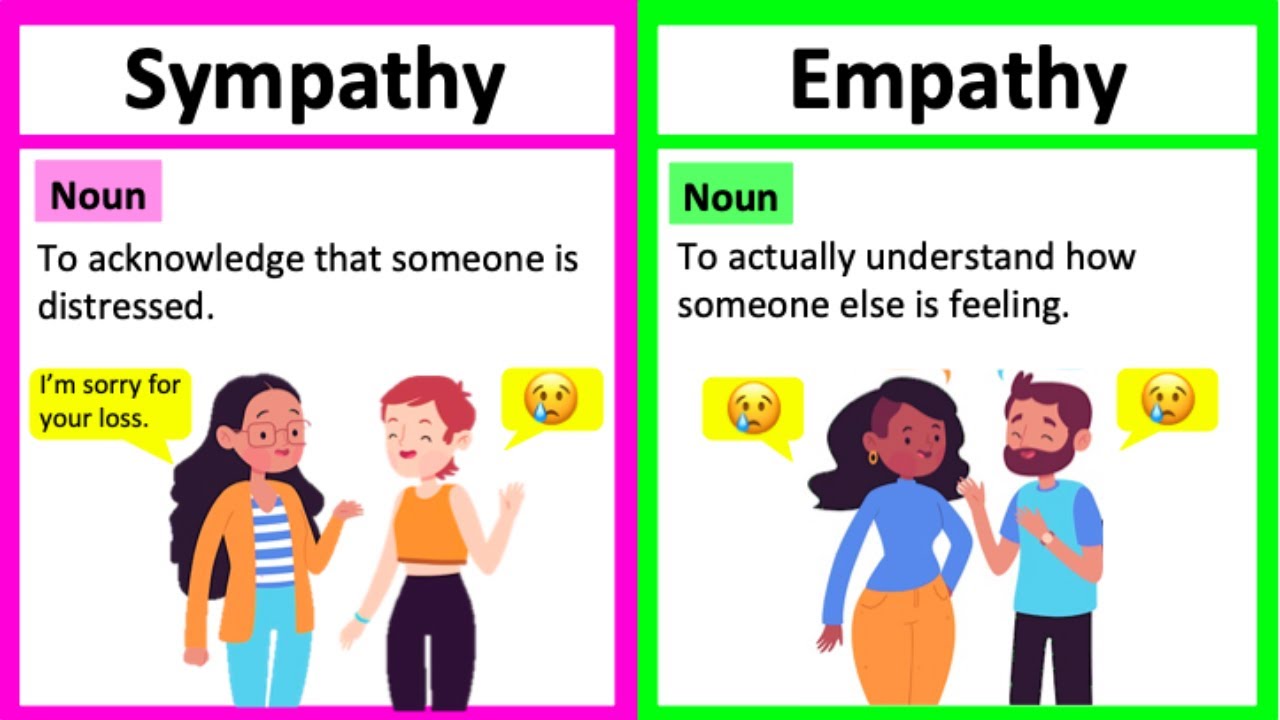Except vs. Accept
Insure vs. Ensure
Its vs. It's
Their/There/They're
Then vs. Than
Your vs. You're
Which vs. That
No vs. Know
To/Too/Two
I would like to point out that these are mere words and usually not actions. Is there really any fault created by the misuse of one of the words above? Not really, unless you are an English teacher and on the receiving side of the conversation. Most of the words listed above would only be noticed as incorrect if they were placed into writing, rather than vocal conversation.
However, there are two words that are interchangeably used incorrectly in today's modern grammar. They are "Sympathy" and "Empathy."
The Oxford Languages Dictionary defines Sympathy as "feelings of pity or sorrow for someone else's misfortune." For Example: They had great sympathy for the flood victims."
The Oxford Languages Dictionary defines Empathy as "the ability to understand and share the feelings of others."
Why does this matter? Is it really important in the grand scheme of things? No, not really as far as grammar goes. However, it can be tantamount in your actions to others. Unless you can truly understand what someone is going through, then it is always wisdom to abstain from trying to act like you do.
I am obviously writing this from the slant of a grieving father who has lost an adult child. It can however be used in pretty much any facet of life. If a friend of yours lost his job and you never have, then you can't empathize with that person. If you have never had cancer, than you can't empathize with what that co-worker is going through in their cancer treatments. If you have never had a certain shared trauma in your life, then it is hard to empathize with somebody, but you can for sure sympathize with their situation and what they are going through.
I recently had a conversation with another couple of dads, and we were talking about how going through this shared trauma of losing a child has increased our wisdom exponentially. Prior to us going through this trauma and grief in our lives, we all agreed that everything else in life was trivial and miniscule compared to what we endure on any given day.
Why is it important for us to understand the two uses of a similar word when it comes to your interactions with others?
First, in no way am I suggesting that if you haven't gone through a shared experience that you can honestly relate with, that you should hold your tongue. Quite to the contrary. We are built in life to communicate and support each other. It is a rarity that somebody makes it through their entire life without having some kind of trauma. No, I didn't type "drama," but rather "trauma." We all have way too much drama in our lives. Just a single day of parenting might entail a life's worth of drama. So, speak up! It is recommended to NOT say: "I COULDN'T EVEN IMAGINE WHAT YOU ARE GOING THROUGH!" I put that in all CAPS on purpose, as it is usually spoken in a very depressing tone. Instead, try saying "I just want you to know that you are loved and not alone! How can I be here for you, and what do you need?" This turns the conversation from more of a depressing tone of reminder of the trauma that somebody is going through, to one of solution, solace, and affirmation that they are not alone. Empathy is not a requirement for one to be able to communicate with another's trauma.
Second, Please Please Please understand that you do not know it all. At 48 years old I realize how little I know most days. Just yesterday I helped my neighbor in his 70's replace a fuse in his lawnmower. He had no idea that they even had fuses, and neither did I rub it in his face. I am sure that by the close of the week, he will have taught me at least 10 things that I had no clue about. Life is about being teachable and coachable. In the past several years, I have fallen in love with the saying "Stay in your lane, Bro!" It should not be interpreted as only communicate about a topic if you know anything about it. You can still communicate about ANY topic, but it should be understood that you don't know everything, and as aforementioned, if you are in the sympathy camp, just let the person know that you love them, and they are not alone. The world is full of narcissist who make everything about themselves, and in their search for wisdom, they became fools.
Thirdly, don't be cliche with your words. There is nothing wrong with thanking a soldier for their service, but sometimes I think most have forgotten what it means, and they are just repeating a PC term that most use. Be deliberate not only with your words, but with your actions. If you let someone know that they are not alone, then mean it. Telling someone they are not alone because you are standing next to them at that moment, but never again gracing them with your presence, is just purely asinine. Make yourself available to them. Showing love and affection is not a noun, but rather a verb.
In closing, rest assured that life constantly changes around each and every one of us. I do not wish trials, tribulations, and testings on anyone, they just happen. It is a testing of our metal to see what we are made of. Nobody should have to go through these alone. Just like the changing of the seasons, you might be in a very green lush period of your life. However, the person to your right or left might be seeing the leaves falling in their life. Life will be much easier for you in the hard times, if you invest into friends lives when everything is going well for you, so that just possibly (barring a life of selfishness) that person might reciprocate it back to you when you are going through a rough patch.


 RSS Feed
RSS Feed
